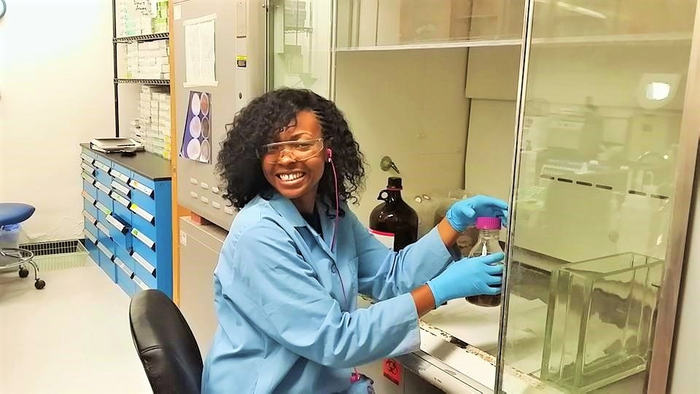The Food and Agriculture Organization (FAO) estimates that 25% of global food crops are contaminated with different types of fungal toxins, such as aflatoxins, highly toxic and carcinogenic substances produced by certain species of the fungus Aspergillus. New research published in Plant Disease reveals a deeper understanding of how members of this same fungus species can be used to reduce aflatoxins in crops.
“Some strains of Aspergillus do not produce aflatoxins and are called atoxigenic strains,” explained plant pathologist Lourena Arone Maxwell, who is part of the team behind this research. “These atoxigenic strains can outcompete aflatoxin-producing strains during crop colonization and reduce overall aflatoxin contamination in food and feed crops.”
This technique is what’s known as biological control, which refers to the process of using beneficial organisms to control agricultural pests rather than relying on toxic chemicals. Biocontrol products, or biopesticides, utilizing highly competitive atoxigenic strains are commercialized and used in North America, Africa, Europe, and Asia. These products are environmentally safe and using them is currently the most effective way to produce foods and feeds that are safe from aflatoxin contamination.
“Our research provides detailed evidence on the ability of atoxigenic biocontrol strains of Aspergillus not only to prevent aflatoxin contamination but to degrade aflatoxins that are already present in the crop,” said Maxwell. “And, for the first time, we demonstrate the ability of aflatoxins to serve as a nutrient source for atoxigenic strains.”
Their findings provide new information and methods that may contribute to a better selection of atoxigenic strains that can be used in biopesticides to reduce aflatoxin contamination in food and feed crops more effectively.
“Furthermore, demonstration of aflatoxin degradation as a new mechanism by which atoxigenic strains reduce aflatoxins in crops points to new application possibilities, such as to assist aflatoxin management during storage and for industries that subject corn to steeping or fermentation such as in both wet and dry milling and the ensiling process used to produce silage for livestock.”
For more information, read “Degradation of Aflatoxins B1 by Atoxigenic Aspergillus flavus Biocontrol Agents” published in Plant Disease.

Credit: Lourena A. Maxwell, Kenneth A. Callicott, Ranajit Bandyopadhyay, Hillary L. Mehl, Marc J. Orbach, and Peter J. Cotty
The Food and Agriculture Organization (FAO) estimates that 25% of global food crops are contaminated with different types of fungal toxins, such as aflatoxins, highly toxic and carcinogenic substances produced by certain species of the fungus Aspergillus. New research published in Plant Disease reveals a deeper understanding of how members of this same fungus species can be used to reduce aflatoxins in crops.
“Some strains of Aspergillus do not produce aflatoxins and are called atoxigenic strains,” explained plant pathologist Lourena Arone Maxwell, who is part of the team behind this research. “These atoxigenic strains can outcompete aflatoxin-producing strains during crop colonization and reduce overall aflatoxin contamination in food and feed crops.”
This technique is what’s known as biological control, which refers to the process of using beneficial organisms to control agricultural pests rather than relying on toxic chemicals. Biocontrol products, or biopesticides, utilizing highly competitive atoxigenic strains are commercialized and used in North America, Africa, Europe, and Asia. These products are environmentally safe and using them is currently the most effective way to produce foods and feeds that are safe from aflatoxin contamination.
“Our research provides detailed evidence on the ability of atoxigenic biocontrol strains of Aspergillus not only to prevent aflatoxin contamination but to degrade aflatoxins that are already present in the crop,” said Maxwell. “And, for the first time, we demonstrate the ability of aflatoxins to serve as a nutrient source for atoxigenic strains.”
Their findings provide new information and methods that may contribute to a better selection of atoxigenic strains that can be used in biopesticides to reduce aflatoxin contamination in food and feed crops more effectively.
“Furthermore, demonstration of aflatoxin degradation as a new mechanism by which atoxigenic strains reduce aflatoxins in crops points to new application possibilities, such as to assist aflatoxin management during storage and for industries that subject corn to steeping or fermentation such as in both wet and dry milling and the ensiling process used to produce silage for livestock.”
For more information, read “Degradation of Aflatoxins B1 by Atoxigenic Aspergillus flavus Biocontrol Agents” published in Plant Disease.
Journal
Plant Disease
DOI
10.1094/PDIS-01-21-0066-RE
Method of Research
Experimental study
Subject of Research
Not applicable
Article Title
Degradation of Aflatoxins B1 by Atoxigenic Aspergillus flavus Biocontrol Agents
Article Publication Date
12-Oct-2021




